As a lover of poets, I occasionally comment on other people's works. Through praise and criticism of the pros and cons, I can further explore the poetic meaning and share the beauty and joy of the soul with more people. Recently, the popular AI machine poetry review on the Internet has made me feel overwhelmed, confused and under a certain amount of pressure, as if I had been hit by a punch. Take a look at the titles of these articles - "AI robot reviewed 10 poems, and poetry critics couldn't sit still" "Can AI robots surpass poetry critics in writing poetry reviews?" ” is shocking and scary enough. Thinking back to the previous news about machines writing poems, does it mean that a new era of poems that everyone can write and comment on is coming? actually not. The so-called AI refers to artificial intelligence, which is a branch of computer science. According to scientists’ predictions, AI will be able to handle many jobs in the future, and replacing humans in the workplace will become an inevitable trend. We will not discuss the correctness of this view for now, but when judging the level of machine writing, we should use artistic effect as the standard and make convincing judgments based on the actual situation. Because through careful analysis of the so-called "machine poetry reviews", I found that most of these reviews pile up nouns, explain concepts, and are vague. This is a bit like a fortune teller. What he says is generally relatively general, and most of them are specious. Anyone can guess it, but There is no clear indication, no details, and no clear conclusion. So, is this a common flaw in AI poetry review?
Give me an example. This rewritten sentence is: "The memory of scars lasts forever/It remains deep after healing/But the pain/is only in this moment." AI can put it like this: "This poem deeply considers the meaning and importance of poetry creation by depicting scars and pain.". Testimonies of pain and psychological recovery caused by scars can be important material in a poet's creative process. But even if the scar heals, the pain will always exist, which means that the poet's creation is not just about superficial description, but also about pain and exploration. This poem is presented from this perspective, conveying the essence of the poet's creation in concise language, which is thought-provoking. These words only explain the title and clarify the concept, but do not expand and explain the poetic context and poetic meaning. Moreover, such text may have been processed and organized by the author, because I saw the advice of the development AI engineer: after using AI writing to generate text, it should be reviewed and modified in a timely manner so that it can have reasonable thinking logic and complete text. Look, there is still someone behind this machine.
Give another example. My song "Learning to Oil Oil": "The eight habits are hidden like Qing Xiu, and the greasy powder is newly painted on the small white building. The old wine stains the lips and the poems are more thoughtful, and the fireworks are sent to Yangzhou in March. Based on the above comments, it can be rephrased as: "This poem By describing the secluded life, the poem expresses the author's yearning and love for nature, wine, poetry and distant places. ". Among them, 'eight practices' refers to the eight ways of self-cultivation of hermits, greasy powder refers to the powder used by women for makeup, and Xiaobailou refers to the house where hermits live. The next few sentences show the author's understanding of poetry. and the love of beautiful scenery. "Sending to Yangzhou expresses the author's longing for his distant friends. The whole poem is simple and natural, with both the hermit's pure style and the poet's heroic spirit." Except for the same words as the previous poem. In addition to repeatedly piling up concepts and ambiguity, he actually interpreted the place name of Beijing "Dong Si Ba Tiao" as the eight ways of self-cultivation of hermits. Of course, I prefer to believe that this is just the cleverness of the AI machine.
It can be seen that AI is a machine after all. It can replace some simple labor of human beings, and even some more complex tasks such as programming and writing codes. However, in the face of artistic creation that represents the crystallization of human wisdom, it can only be in despair. AI poetry review actually organizes and constructs relevant text on a specific theme through fixed and general pattern thinking with human intervention. As poetry criticism, it lacks personality and therefore lacks clarity; it lacks vitality and therefore lacks a sense of freshness. AI is basically just a tool that groups together nouns, concepts, and language that will be very similar and will appear repeatedly if used under the same topic. The above two examples are enough to prove that these lifeless and thoughtless writings are actually meaningless.
When AI is used as an auxiliary tool or reference text, it can sometimes bring some fun and even inspire inspiration, and can be used in poetry learning and poetry criticism. I think the significance of AI poetry review may also be that it always reminds us poet reviewers to be more accurate, more sophisticated and more personalized when reviewing poetry, to stay away from vague and ambiguous comments, and to use more Use unique vision and vivid writing to interpret different poetic contexts, discover and capture the interesting and unique beauty in poetry, and appreciate the cultural value of "high emotions, high ambitions, and beautiful people". In providing the highest level of literary experience, we do not open the door to boring and mediocre machine poetry. Although science and technology continue to develop, we have good reasons to believe and firmly believe that certain tasks such as poetry criticism are irreplaceable. As human auxiliaries and tools, machines can never replace humans with the highest wisdom on earth, let alone poetry, the ancient and bright pearl in the crown of literature.
"China Culture News" on May 18, 2023
Special report published on Page 3
"After reading AI poetry review, I have something to say"
↓ ↓ ↓ ↓ ↓ ↓ ↓ ↓ ↓

Editor: Zhang Haining
The above is the detailed content of After reading AI poetry review, I have something to say. For more information, please follow other related articles on the PHP Chinese website!
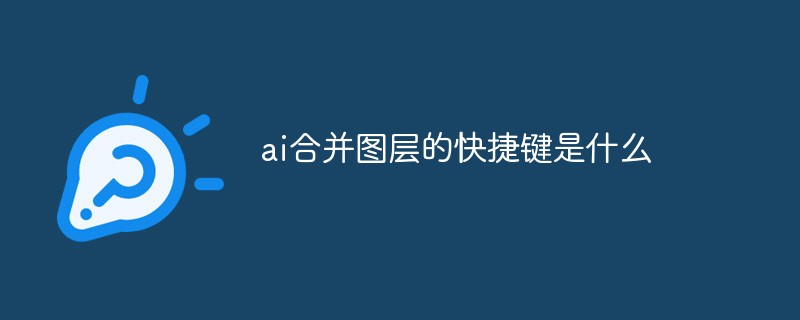 ai合并图层的快捷键是什么Jan 07, 2021 am 10:59 AM
ai合并图层的快捷键是什么Jan 07, 2021 am 10:59 AMai合并图层的快捷键是“Ctrl+Shift+E”,它的作用是把目前所有处在显示状态的图层合并,在隐藏状态的图层则不作变动。也可以选中要合并的图层,在菜单栏中依次点击“窗口”-“路径查找器”,点击“合并”按钮。
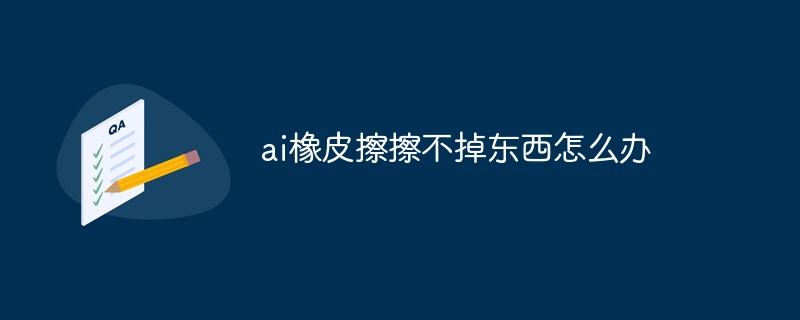 ai橡皮擦擦不掉东西怎么办Jan 13, 2021 am 10:23 AM
ai橡皮擦擦不掉东西怎么办Jan 13, 2021 am 10:23 AMai橡皮擦擦不掉东西是因为AI是矢量图软件,用橡皮擦不能擦位图的,其解决办法就是用蒙板工具以及钢笔勾好路径再建立蒙板即可实现擦掉东西。
 谷歌超强AI超算碾压英伟达A100!TPU v4性能提升10倍,细节首次公开Apr 07, 2023 pm 02:54 PM
谷歌超强AI超算碾压英伟达A100!TPU v4性能提升10倍,细节首次公开Apr 07, 2023 pm 02:54 PM虽然谷歌早在2020年,就在自家的数据中心上部署了当时最强的AI芯片——TPU v4。但直到今年的4月4日,谷歌才首次公布了这台AI超算的技术细节。论文地址:https://arxiv.org/abs/2304.01433相比于TPU v3,TPU v4的性能要高出2.1倍,而在整合4096个芯片之后,超算的性能更是提升了10倍。另外,谷歌还声称,自家芯片要比英伟达A100更快、更节能。与A100对打,速度快1.7倍论文中,谷歌表示,对于规模相当的系统,TPU v4可以提供比英伟达A100强1.
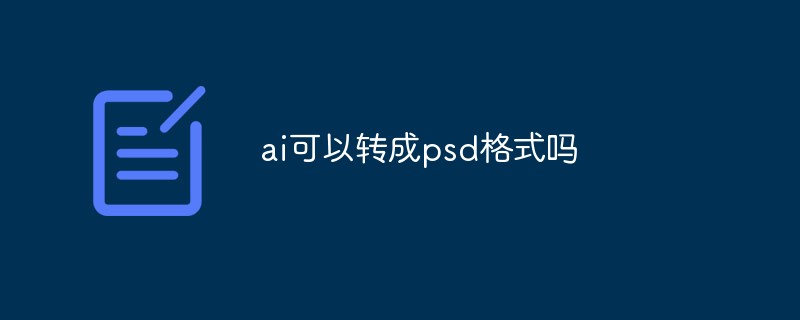 ai可以转成psd格式吗Feb 22, 2023 pm 05:56 PM
ai可以转成psd格式吗Feb 22, 2023 pm 05:56 PMai可以转成psd格式。转换方法:1、打开Adobe Illustrator软件,依次点击顶部菜单栏的“文件”-“打开”,选择所需的ai文件;2、点击右侧功能面板中的“图层”,点击三杠图标,在弹出的选项中选择“释放到图层(顺序)”;3、依次点击顶部菜单栏的“文件”-“导出”-“导出为”;4、在弹出的“导出”对话框中,将“保存类型”设置为“PSD格式”,点击“导出”即可;
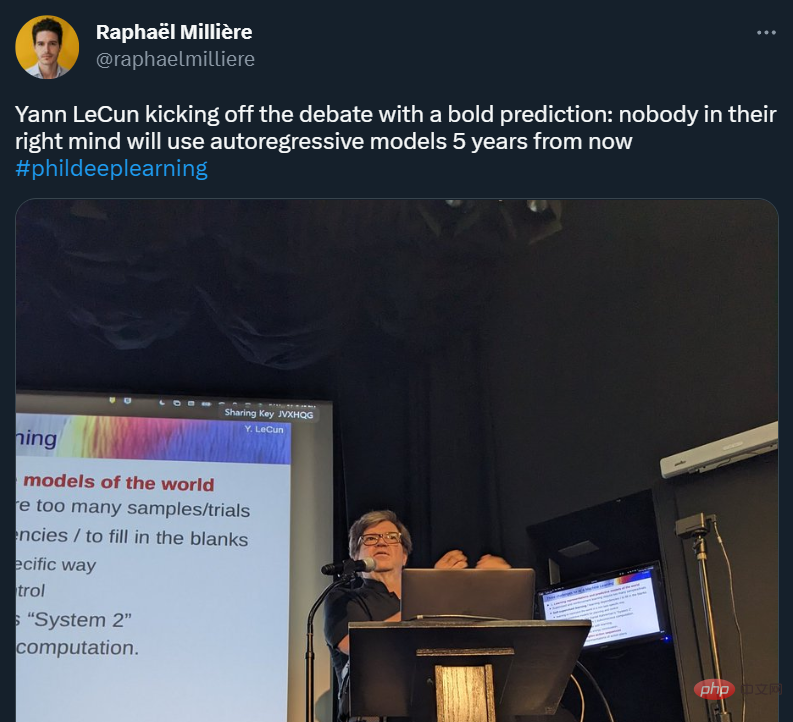 GPT-4的研究路径没有前途?Yann LeCun给自回归判了死刑Apr 04, 2023 am 11:55 AM
GPT-4的研究路径没有前途?Yann LeCun给自回归判了死刑Apr 04, 2023 am 11:55 AMYann LeCun 这个观点的确有些大胆。 「从现在起 5 年内,没有哪个头脑正常的人会使用自回归模型。」最近,图灵奖得主 Yann LeCun 给一场辩论做了个特别的开场。而他口中的自回归,正是当前爆红的 GPT 家族模型所依赖的学习范式。当然,被 Yann LeCun 指出问题的不只是自回归模型。在他看来,当前整个的机器学习领域都面临巨大挑战。这场辩论的主题为「Do large language models need sensory grounding for meaning and u
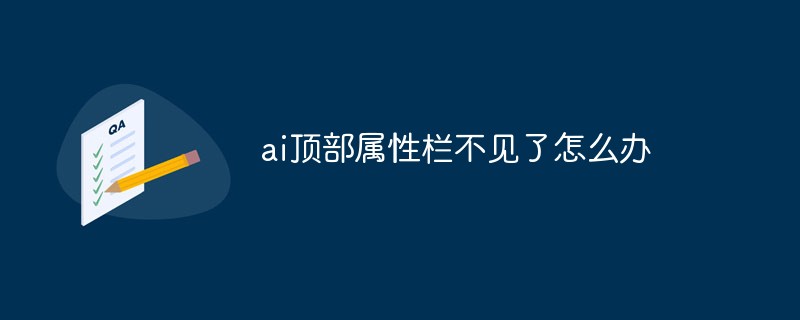 ai顶部属性栏不见了怎么办Feb 22, 2023 pm 05:27 PM
ai顶部属性栏不见了怎么办Feb 22, 2023 pm 05:27 PMai顶部属性栏不见了的解决办法:1、开启Ai新建画布,进入绘图页面;2、在Ai顶部菜单栏中点击“窗口”;3、在系统弹出的窗口菜单页面中点击“控制”,然后开启“控制”窗口即可显示出属性栏。
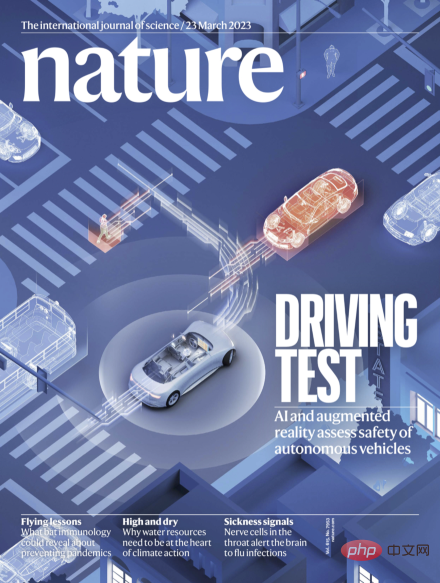 强化学习再登Nature封面,自动驾驶安全验证新范式大幅减少测试里程Mar 31, 2023 pm 10:38 PM
强化学习再登Nature封面,自动驾驶安全验证新范式大幅减少测试里程Mar 31, 2023 pm 10:38 PM引入密集强化学习,用 AI 验证 AI。 自动驾驶汽车 (AV) 技术的快速发展,使得我们正处于交通革命的风口浪尖,其规模是自一个世纪前汽车问世以来从未见过的。自动驾驶技术具有显着提高交通安全性、机动性和可持续性的潜力,因此引起了工业界、政府机构、专业组织和学术机构的共同关注。过去 20 年里,自动驾驶汽车的发展取得了长足的进步,尤其是随着深度学习的出现更是如此。到 2015 年,开始有公司宣布他们将在 2020 之前量产 AV。不过到目前为止,并且没有 level 4 级别的 AV 可以在市场
 ai移动不了东西了怎么办Mar 07, 2023 am 10:03 AM
ai移动不了东西了怎么办Mar 07, 2023 am 10:03 AMai移动不了东西的解决办法:1、打开ai软件,打开空白文档;2、选择矩形工具,在文档中绘制矩形;3、点击选择工具,移动文档中的矩形;4、点击图层按钮,弹出图层面板对话框,解锁图层;5、点击选择工具,移动矩形即可。


Hot AI Tools

Undresser.AI Undress
AI-powered app for creating realistic nude photos

AI Clothes Remover
Online AI tool for removing clothes from photos.

Undress AI Tool
Undress images for free

Clothoff.io
AI clothes remover

AI Hentai Generator
Generate AI Hentai for free.

Hot Article

Hot Tools

MantisBT
Mantis is an easy-to-deploy web-based defect tracking tool designed to aid in product defect tracking. It requires PHP, MySQL and a web server. Check out our demo and hosting services.

SublimeText3 Chinese version
Chinese version, very easy to use

Dreamweaver CS6
Visual web development tools

mPDF
mPDF is a PHP library that can generate PDF files from UTF-8 encoded HTML. The original author, Ian Back, wrote mPDF to output PDF files "on the fly" from his website and handle different languages. It is slower than original scripts like HTML2FPDF and produces larger files when using Unicode fonts, but supports CSS styles etc. and has a lot of enhancements. Supports almost all languages, including RTL (Arabic and Hebrew) and CJK (Chinese, Japanese and Korean). Supports nested block-level elements (such as P, DIV),

DVWA
Damn Vulnerable Web App (DVWA) is a PHP/MySQL web application that is very vulnerable. Its main goals are to be an aid for security professionals to test their skills and tools in a legal environment, to help web developers better understand the process of securing web applications, and to help teachers/students teach/learn in a classroom environment Web application security. The goal of DVWA is to practice some of the most common web vulnerabilities through a simple and straightforward interface, with varying degrees of difficulty. Please note that this software






